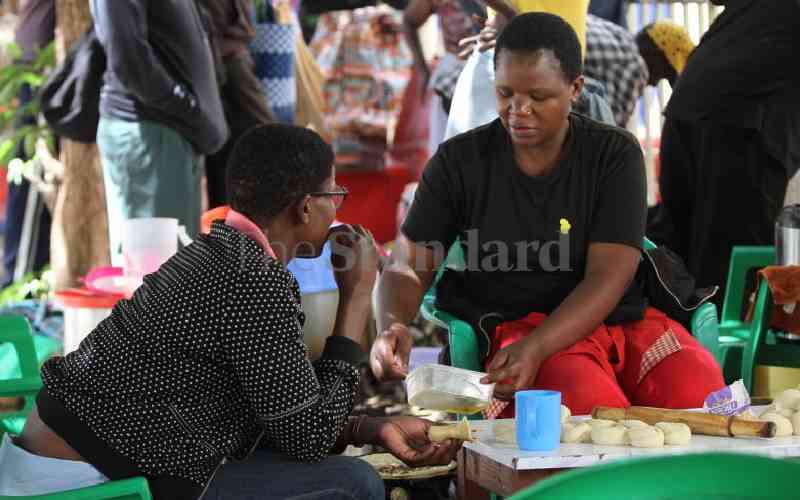To her compatriots and fans, she has been a cultural custodian, a teacher and a mentor –– a deeply appreciated influencer. In her artistic undertakings she was the symbol of a woman of power. But Sibongile Mngoma Khumalo, the incredible South African jazz singer, is gone. She died on January 28, in Johannesburg, from a stroke attack after a four-year long illness. She was 63.
Her husband was the actor and film director Siphiwe Khumalo, who died in 2005. They had two children: daughter Ayanda, an actor-singer, and son Tshepo Khumalo, a violinist-singer-producer.
Born into a musical family on September 24, 1957 in Orlando West, Soweto, her father Khabi Mngoma was a classical musician and a music professor at the University of Zululand, her mother, Grace Mngoma, was a professional nurse and a gifted classical singer, too, her brother Lindumuzi plays the cello, and her grandfather was a traditional maskandi musician.
Graciously, Sibongile fulfilled her part of the timeline that still continues to work out ways of lifting up the voices of the millions in her country in need of understanding and a helping hand. She became a revelation for the younger artists (including her own children) whom she influenced and stimulated to offer their best, as much as she called to their attention the utmost need for originality. Equally impressive was her ability to maintain interactions with her instrumentalists. Sibongile performed her final gig last year side-by-side with Tshepo.
Sibongile performed with energized liveliness, as witnessed in 1993, during the 75th birthday celebration of Mzee Nelson Mandela and also the following year (1994) during his installation as the President of the Republic of South Africa –– when Mandela lovingly christened her The First Lady of Song, thus taking her career a notch higher.
Her repertoire covered traditional South African music, jazz, pop, and classical. In fact, she pioneered the infusion of African sensibilities into the western classical music and, more than any of her compatriots, popularized African traditional music on various platforms. Years into her career, she became a legend.
But Sibongile had all along a clear vision of her role and place in life, not only as a musician and recording artist but also as a social influencer among her compatriots. Although she wrote many songs themed on romantic relationships, she also composed serious pieces that reflected the pride in what had been accomplished during her country’s many years of liberation struggles.
Her lyrics celebrated that sense of victory that took years of toil, hardships and sacrifices to liberate the indigenous people of Azania (South Africa). Indeed, her rhetoric, similar to that of fellow composers of her generation and those before them, seemed to instill high hopes for attaining her country’s freedom as realistic.
Sibongile’s forerunners, the legendary Dorothy Masuka and Miriam Makeba, who shared their experiences as black singers under apartheid rule, and whose music in and out of South Africa paralleled the finest jazz singers the world ever got to hear from the 1960s to 1980s, no doubt offered a vital reference point and motivation. In numerous recordings, Ms. Khumalo resonated with influences from the late two queens of the African ballad that informed her equally enchanting vocal style.
Similarly, on her self-titled album of 2005, she covered compositions by her childhood influencer, Constance Magogo KaDinizulu, the Zulu Princess renowned for her compositions and singing prowess.
And even long after making it on the international stage, she courteously maintained her appreciation for them by regularly inserting phrasings inspired by them; but she in no way tried to compare and measure hers to theirs. But one quality shall remain poignant: these three lady singers were among the millions of South Africans who vividly shared their experiences as black people who had immensely suffered under the racist segregation rule.
On ballads, she had the sort of voice that would put you instantly in a nostalgic mood; that medium-high-pitched voice that soothes an otherwise hurting soul. Personally, I admired her style; she never felt at a loss for a phrase since she found great pleasure combining various South African idioms with jazz into her singing. Seliyana is one such piece –– a soft ballad that defined her engaging mode.
Ms. Khumalo, two Bachelor of Arts Degrees from the Zululand University (where she also taught in the 1980s) and from the University of Witwatersrand, where she also earned a post-graduate diploma in Personnel Management, started her singing career at the Kippies Jazz International in 1992 and with an effort of pure will she was able to record nine impressive albums.
Her debut album, Ancient Evenings, came out in 1996, then came Live at the Market Theatre (1998), Immortal Secrets (2000), Quest (2002), the self-titled Sibongile Khumalo, Sibongile’s Greatest Hits (2006), Sibongile Khumalo Live (2009), and Breath of Life (2016), her last album. Other popular African songs she covered included Meadowlands by Strike Vilakazi, Back of The Moon by Todd Matshikiza, U Ea Kae (Where Are You Going) by Joshua Pulumo, John Knox Bokwe’s Plea for Africa, and Mzilikazi Khumalo’s (no relation) Ma Ngificwa Ukufa (On My Demise).
By a good deal of studious effort and talent, Sibongile became pretty well-known, ascending to admirable prominence with her singing style leaving her listeners (mostly those of the opposite gender to hers) helplessly smitten with the charms of a warm-hearted romantic singer. She created a link between her songs and her homeland; but along her career, most importantly, she dedicated her musical soul to her people and the rest of us from elsewhere.
Stay informed. Subscribe to our newsletter
With her death, and just a few days before that of jazz trombonist Jonas Gwangwa, the jazz scene in South Africa is surely undergoing a major face-lift. But no soul, be it that of a male or female, is immortal and none beholds the light. For each one, there will come the time when the light shall fade and dim out completely.
So, may Sister Sibongile Khumalo’s spirit forever dwell.
 The Standard Group Plc is a
multi-media organization with investments in media platforms spanning newspaper
print operations, television, radio broadcasting, digital and online services. The
Standard Group is recognized as a leading multi-media house in Kenya with a key
influence in matters of national and international interest.
The Standard Group Plc is a
multi-media organization with investments in media platforms spanning newspaper
print operations, television, radio broadcasting, digital and online services. The
Standard Group is recognized as a leading multi-media house in Kenya with a key
influence in matters of national and international interest.
 The Standard Group Plc is a
multi-media organization with investments in media platforms spanning newspaper
print operations, television, radio broadcasting, digital and online services. The
Standard Group is recognized as a leading multi-media house in Kenya with a key
influence in matters of national and international interest.
The Standard Group Plc is a
multi-media organization with investments in media platforms spanning newspaper
print operations, television, radio broadcasting, digital and online services. The
Standard Group is recognized as a leading multi-media house in Kenya with a key
influence in matters of national and international interest.









